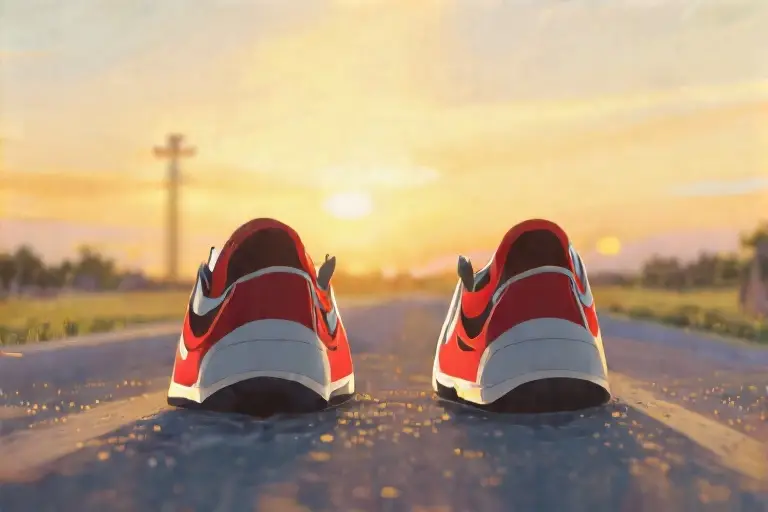The framed diplomas on our parents’ wall tell a story of immigrant success—two sons, one a future attorney, the other a pharmacist in the making. At family gatherings, relatives would nod approvingly at our “resume-level accomplishments,” their eyes glazing over the tension simmering beneath our polite smiles. Paper records show Dean’s Lists and marathon finish lines; they don’t show the nights my brother disappeared into his car after shouting matches about pharmacy school, or the way I’d clutch my law textbooks like armor against becoming him.
Six and a half years separated us—just enough gap for me to witness his stumbles like cautionary tales playing on loop. While other kids had fictional heroes, I had a living blueprint of what not to do: the skipped classes that led to academic probation, the rebellion against our parents’ expectations that left him stranded between cultures. As first-generation Asian Americans, we were already balancing on a tightrope—our parents’ traditional ideals on one side, America’s promise of self-invention on the other. Every misstep of his became my secret guidepost, each one whispering: This could be you if you falter.
Yet for all my careful calculations—teaching special education by day, studying law at night, measuring my worth in completed marathons and published essays—I couldn’t outrun the quiet truth. Our parallel struggles diverged in visibility, not intensity. His battles with mental health left bruises; mine carved hollows beneath my ribcage where survivor’s guilt pooled. The same cultural forces that praised my achievements as the “good son” had cornered him into a pharmacy career he never wanted, a script where stability trumped passion.
When relatives ask why I still run long distances despite my busy schedule, I never mention how the rhythm of footfalls helps drown out the ghostly echo of sibling comparison. Nor do I explain that writing fiction lets me rewrite endings we couldn’t achieve in life. Our story was never as simple as success and failure—it was about two boys handed the same immigrant playbook, each annotating the margins in invisible ink.
The Spectator’s Seat
Growing up six and a half years behind my brother meant I had front-row tickets to a show I never asked to watch. Our tiny apartment in Baltimore became a stage where his teenage rebellions played out like cautionary tales – the burnt rice smell when he skipped family dinners, the slamming doors after arguments about curfews, the hushed phone calls I’d overhear while pretending to do homework at the kitchen table.
As first-generation Asian American kids, we were navigating uncharted territory. Our parents worked brutal hours at their pharmacy, clinging to traditional values that felt increasingly foreign in American classrooms. While they saw education as our golden ticket, my brother saw it as chains. I’ll never forget the afternoon he came home with a shaved head at sixteen, my mother’s chopsticks clattering to the floor as she gasped. That image stayed with me longer than any lecture about grades ever could.
Being the younger sibling in an immigrant family is like having a living, breathing ‘what not to do’ manual. When he dropped his calculus textbook proclaiming “numbers are worthless,” I quietly doubled down on math drills. When he missed his third consecutive Sunday family dinner, I made sure to always set the table precisely at six. These weren’t conscious choices at first – more like survival instincts kicking in whenever I witnessed the aftermath of his decisions.
There was this unspoken rule in our household: every time my brother stumbled, the bar lifted for me. Not because our parents said so, but because I could see the disappointment in the way my father’s shoulders slumped when report cards came. The pharmacy receipts he’d tally at night took longer when my brother was grounded. I learned to associate rebellion with extra shifts at the family store, with tired eyes at breakfast, with that particular silence that hangs between people who’ve run out of ways to say “I’m worried.”
What fascinated me most wasn’t his mistakes themselves, but how they rippled through our family ecosystem. The time he came home past midnight reeking of weed became my mother’s reason for checking my phone logs. His failed driving test at eighteen meant I started practicing parallel parking at fifteen. Even his small rebellions – the dyed streaks in his hair, the band t-shirts he’d wear despite warnings – became data points in my mental spreadsheet of consequences.
Yet beneath my careful note-taking lurked something unexpected: envy. Not for his choices, but for his courage to make them at all. While I perfected the art of invisible compliance, my brother lived in bold strokes of defiance. His mistakes were messy, public, and entirely his own. My “successes” felt like carefully constructed bridges across a ravine I’d never chosen to cross.
This sibling dynamic created an odd form of motivation. I didn’t just want to succeed – I needed his failures to mean something. If I could turn his stumbles into my stepping stones, maybe our parents’ sacrifices wouldn’t feel wasted. Maybe the late nights at the pharmacy would add up to more than just prescription bottles and exhaustion. Maybe, just maybe, one child’s redemption could balance the scales.
Looking back now, I realize how much of my early ambition was really just sophisticated avoidance. Every honor roll certificate was a force field against disappointment, every extracurricular another brick in a wall separating me from his path. Law school applications became my version of teenage rebellion – not against my parents, but against the shadow of what might happen if I stopped running.
What they don’t tell you about sibling rivalry in immigrant families is how the competition gets internalized. Long after my brother moved out, I kept competing with his ghost in my head. That chemistry test I aced after he failed? Still counting. The college acceptance letter he never opened? Filed under “proof I’m different.” Even now, as I prepare for the bar exam while he finishes pharmacy school, part of me is still that little girl taking notes in the spectator’s seat, mistaking survival for living.
The irony isn’t lost on me that in trying so hard not to be like him, I became exactly what our culture celebrates: the overachieving child who mistakes busyness for purpose. While I was busy collecting achievements like merit badges, my brother was doing something far braver – figuring out who he was beneath all those expectations. It would take me decades and twenty-six marathons to understand that sometimes running toward something is just another way of running away.
The Invisible Rope of Immigrant Expectations
Growing up in our household, success wasn’t measured in happiness or personal fulfillment. It came neatly packaged in three measurable metrics: academic honors, professional titles, and how favorably you compared to the cousins back in Taiwan. My parents’ dreams for us were both simple and impossibly complex – they wanted us to achieve what they couldn’t, while remaining unquestioningly grateful for the sacrifice.
I still remember the exact texture of those dinner table conversations. The way my mother’s chopsticks would pause mid-air when recounting how Dr. Chen’s daughter got into Yale Medical School. The particular sigh my father made while reviewing my brother’s report card – not angry, just profoundly disappointed in a way that made my eight-year-old shoulders tense in sympathetic shame. These weren’t just passing comments; they were the threads weaving the invisible rope that would pull us toward predetermined versions of success.
The Comparison Trap
As first-generation Asian Americans, my brother and I existed in constant parallel to three separate measuring sticks:
- Our parents’ immigrant expectations (stable career > passion)
- Mainstream American ideals of self-actualization
- Most painfully, each other’s evolving paths
Pharmacy versus law. Marriage plans versus marathon medals. Every life choice became data points in some unspoken sibling evaluation system our parents maintained. I’d notice how my mother’s voice brightened when introducing me as “my daughter, the future lawyer,” while my brother’s pharmacy school struggles got condensed into “he’s still figuring things out.”
Cultural Whiplash
The pressure manifested in ways our non-immigrant friends never understood. While their parents worried about drug use or reckless driving, mine panicked over B+ grades and liberal arts electives. I learned to hide my creative writing notebooks like contraband, typing stories secretly after bedtime because “writers starve” according to Dad’s immigrant logic.
Yet beneath the rigid expectations lay something more tender – the frightened love of people who’d gambled everything on our futures. When my mother whispered “just be a pharmacist like your cousin – steady work,” it translated to “I never want you to know the hunger I fled from.” Their dreams for us were survival strategies dressed up as ambitions.
Breaking the Cycle
It took running literal marathons to understand: I’d been racing toward a finish line someone else drew. The moment of clarity came unexpectedly during a 20-mile training run, sweat stinging my eyes as I realized – no matter how fast I went, I’d never outrun the comparisons. Not until I defined what success meant for me.
Now when my parents mention Dr. Chen’s daughter, I smile and ask if she’s happy. When they fret about my writing taking time from legal studies, I show them my published essays without apology. The rope still tugs sometimes, but I’ve learned to brace against it without resentment – understanding it’s woven from love as much as fear.
For anyone navigating similar cultural crosscurrents, I’ll offer this: immigrant parents give us roots and wings in equal measure, even if the wings sometimes feel like weight. Honor their sacrifices without being crushed by them. And when the comparison game becomes too loud, remember – sibling rivalry fades, but the peace of self-definition lasts forever.
Beneath the Surface: The Hidden Struggles We Carry
On the surface, our family portrait looked like the classic immigrant success story—two sons with advanced degrees, stable careers, and all the outward markers of achievement. But family portraits, like resumes, only show what we choose to frame. They never capture the quiet moments when my brother would excuse himself from holiday dinners, or the way my mother’s voice would tighten when neighbors asked about his prolonged pharmacy studies.
The Weight of Unspoken Pain
For years, I measured my progress against his struggles. Every time I pulled an all-nighter for law school or crossed a marathon finish line, part of me whispered: At least I’m not making his mistakes. But adulthood revealed a harder truth—my brother wasn’t just making “mistakes.” He was drowning in currents I’d been too young to recognize: the pressure of being our parents’ first American experiment, the loneliness of navigating two cultures without a map, the depressive episodes he hid behind clinical terms about “pharmacy board delays.”
I remember the first time I saw him cry. We were in his car after another tense family brunch where Dad had compared his incomplete degree to my teaching job. “You think I chose this?” he said, fingers gripping the steering wheel. “Every time I open a textbook, it’s like the pages are screaming that I’m not good enough.” In that moment, I realized we’d been climbing the same mountain—him carrying boulders of expectation, me running upward just to prove I wouldn’t fall.
The Mirror of Survivor’s Guilt
Law school taught me a term for what I felt: survivor’s guilt. Why did I thrive in night classes while he cracked under daytime lectures? Why could I compartmentalize our parents’ criticism as “motivation,” when for him it became paralyzing? The more “successful” I appeared, the wider the gulf between us grew—until one Thanksgiving when he didn’t come home at all.
That’s when I began noticing the patterns beneath our sibling rivalry:
- The Proxy War: Our achievements and failures weren’t just ours—they were our parents’ validation for leaving their homeland
- The Loneliness of the First-Gen Path: No one in our family could advise him on handling American grad school pressures while honoring filial duties
- The Myth of Linear Success: My marathon medals gave me permission to struggle publicly, while his pharmacy setbacks were framed as moral failures
Redefining the Finish Line
Last winter, I visited him after he’d finally earned his degree. His apartment walls were bare except for a single photo: us as kids building a sandcastle, back when our dreams didn’t have to mean anything yet. That image became my compass. Now when we talk, I share my law firm rejections alongside promotions. He tells me about the anxiety medication he takes before shifts. Our resumes still look different, but the space between them no longer feels dangerous.
Perhaps this is the real inheritance of immigrant children—not the weight of comparison, but the slow understanding that survival looks different on everyone. My brother wasn’t the cautionary tale I’d constructed; he was simply a man learning to swim in deeper water than our parents ever had to navigate. And that, I’m finally seeing, is its own kind of marathon.
Finish Lines and Starting Points
The medals hanging on my wall tell a story of 26.2 miles conquered, but they don’t show the training runs in Baltimore’s predawn darkness. They don’t reveal the moments when my legs burned with exhaustion during those final law school semesters, when I’d transition directly from teaching special education classes to evening lectures at the university. This duality—pursuing multiple passions while navigating cultural expectations—became my personal marathon long before I ever pinned on a race bib.
The Unconventional Path to Fulfillment
Most first-generation Asian Americans understand the script we’re handed: excel academically, secure a prestigious career, fulfill our parents’ immigrant sacrifices. My brother followed parts of that trajectory into pharmacy school, while I took what seemed like detours—teaching in under-resourced schools, writing personal essays between cases, choosing a legal career later than most. Yet these apparent deviations became my compass for redefining success beyond resume bullet points.
Running taught me what no cultural playbook could:
- Progress isn’t linear: Some training runs felt effortless while others left me questioning my ability—just like balancing law studies with teaching
- The importance of pacing: Unlike the sprint mentality of traditional achievement, marathon training values consistent effort over time
- Listening to your body: Learning when to push through discomfort versus when to rest became a metaphor for honoring my limits
Writing as Reconciliation
My journal pages became a private courtroom where I prosecuted no one. Through writing, I could:
- Examine my complicated feelings about sibling comparison without judgment
- Process the survivor’s guilt of being the “successful” child
- Find language for experiences that didn’t fit either cultural narrative—American or Asian
A particular breakthrough came when I wrote about watching my brother struggle with prescription medications during pharmacy school. The irony wasn’t lost on me—the healer needing healing, the drug expert battling dependency. My pen gave me the distance to see our stories as parallel journeys rather than opposing outcomes.
Redefining the Race
Finishing my first marathon didn’t erase the complex relationship with my brother, just as passing the bar exam didn’t resolve all my cultural tensions. But these pursuits taught me to measure success differently:
| Traditional Metric | Personal Meaning |
|---|---|
| Career title | Impact on clients’ lives |
| Academic honors | Lessons from failures |
| Family approval | Authentic self-expression |
During our last family dinner, I noticed my brother’s hands—those same hands that once trembled during withdrawals now carefully measuring medications for patients. Our paths had diverged, yet converged in unexpected ways. His journey through darkness gave him an empathy I’ll never fully possess, just as my unconventional route granted me freedoms he never claimed.
The Ongoing Marathon
These days when I run, I no longer imagine racing against anyone’s expectations—not my parents’, not society’s, certainly not my brother’s. Each footfall reminds me that life, like endurance training, isn’t about reaching some predetermined finish line. The real transformation happens in the daily showing up, the willingness to keep moving even when the route gets messy.
Perhaps that’s the ultimate lesson from being a spectator to my brother’s struggles—not just learning what to avoid, but discovering that healing often looks different than we expect. My marathon medals gleam beside my law degree, but the quieter victories shine just as bright: the student who finally grasped a concept, the essay that resonated with another first-gen reader, the silent car ride with my brother that no longer feels heavy with unspoken comparisons.
Success, I’ve learned, isn’t about outrunning anyone else’s demons. It’s about having the courage to face your own—one mile, one page, one honest conversation at a time.
The Medals We Never Knew We Earned
The marathon medal hangs heavy around my neck as I stare at my reflection in the hotel mirror. Twenty-six point two miles of asphalt still hum in my legs, but it’s the invisible weight I’ve carried since childhood that aches most. Across the country, my brother is likely counting pills in a pharmacy backroom, just as he’s done every weekend for the past three years. Our parents’ American dream realized—an attorney and a pharmacist. The perfect immigrant success story. Except no one tells you success smells like antiseptic and legal pads, tastes like protein bars eaten during midnight study sessions, sounds like the echo of unanswered family group texts.
What does your version of success look like when the finish line keeps moving?
I used to think crossing this stage with a juris doctor would mean I’d won—outrun the shadow of sibling comparison, satisfied the unspoken family ledger where my achievements balanced his struggles. But the truth I discovered somewhere between mile eighteen of the Chicago Marathon and my third cup of courthouse coffee is this: we were never running the same race. His pharmacy white coat and my bar admission card are just different-colored bibs pinned to the same existential course.
For those keeping score at home:
- Brother A: JD candidate, marathon finisher, published essayist
- Brother B: PharmD candidate, full-time technician, silent dinner attendee
Yet the spreadsheet never accounts for the way his hands shake when measuring antidepressants, or how my race photos always show me glancing sideways as if expecting someone. Our resume bullet points glitter like the medals we display, but the real victories happen in unseen moments: when he texts me a rare “good luck in court” or when I finally stop mentally converting his hourly wage to annual salary.
Three things no one prepares you for about sibling rivalry in adulthood:
- The guilt that comes with “winning”
- The strange grief when they stop competing back
- Realizing your parents’ proud smiles fit both of you equally
This isn’t where I offer tidy solutions. If years of legal training taught me anything, it’s that some cases don’t close neatly. Maybe healing looks like remembering how we built Lego towers together before we learned to compare college acceptances. Maybe it’s acknowledging that every time I pass a CVS, I still check for his face behind the counter—not to measure his progress, but just to see my brother.
The marathon taught me this: water stations aren’t signs of weakness, but survival. So here’s my paper cup held out to you, dear reader. What invisible weights have you been carrying across your own finish lines? And who might be waiting to hand you the next drink if you’d only slow down long enough to take it?





